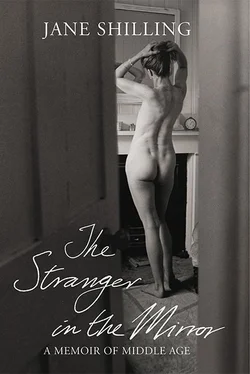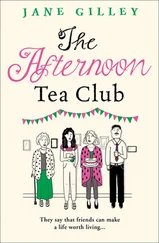A few miles down the road, I began to think that I wasn’t all right at all. There was a vivid, unpleasant sensation in my left hip where I had landed on the pole – a hot, hard pain, like the feeling you get if you turn your neck awkwardly, but much worse, as though something had burst or ruptured inside. I drove back to London gnawing my lip and trying not to cry.
Once home I considered briefly going to casualty, weighed up the certainty of an interminable wait against the almost equal certainty that after several dull and painful hours of sitting about they’d tell me to go away and rest, decided not to bother and crept up to bed where I slept fitfully, waking at intervals to swallow more painkillers, and dreaming again and again of falling headfirst into the log-pile of poles.
The next day I had an appointment with a particularly formidable newspaper editor: not the sort of woman to take a sympathetic interest in a prospective contributor’s low back pain. Walking, I found, was tolerable as long as I moved at a sort of stately glide, like a slow march. But moving from standing to sitting, or vice versa, and sitting down itself were terrible.
The editor was busy when I arrived. Declining her secretary’s offer of a chair, I propped myself against a wall to wait, uneasily aware that I was making the place – all chrome and glass and spindly indoor trees – look untidy. Quarter of an hour passed, and I was shown into an office where the editor sat behind a considerable expanse of desk. In front of the desk was a low metal chair upholstered in squashy leather. Even a large man, sitting in this, would find himself peering up at the person behind the desk like a delinquent child brought into the awful presence of the headmistress. It wasn’t the status issue that bothered me, so much as the question of how I was going to sit down on this piece of furniture without shrieking aloud.
Gripping the metal arms with both hands, I lowered myself into it in slow motion, as though doing bicep-strengthening exercises. The cushions felt as though stuffed with marshmallow. Impossible to find anything rigid against which to brace my back. I clenched my teeth and concentrated on sitting bolt upright.
The editor’s expression of polite professional interest remained unchanged throughout this manoeuvre. Once I had come to rest she began a rapid volley of questions: who was my favourite member of the Cabinet? What did I think of the performance of the Conservatives in Opposition? Who should be the next Mayor of London? What would be the effect of the coming Olympics on the capital’s economy? Where was my son at school?
I knew the answer to this last question. On all the others I put up a very limp performance. There was no fight in me, really. All my reserves of ingenuity were concentrated on not moving. After five minutes of efficient humiliation, the editor smiled a close-lipped smile of dismissal. My cue to leave.
I tried getting out of the chair as I’d got in, with the bicep press, but it was too low. Unless I slid out of it feet-first into a recumbent position on the floor (even in my extremity, I didn’t think I could abandon convention to that extent) there was no way of getting up without a bit of a pelvic thrust. At any rate, I couldn’t hang about any longer. The editor’s eyebrows had started to creep enquiringly up her forehead. I’d better just go for it.
With a heave, I emerged from the chair. It was dazzlingly painful. Through my clenched teeth there emerged a small but clearly audible scream. ‘Riding accident,’ I mumbled apologetically. ‘Bad back…’ The editor waved this away impatiently – I had ceased to exist – and I shuffled from the building. On the bright side, at least the cauterising pain of the hot stone in my hip meant that I scarcely felt the shame of having failed to come up with a convincing mayoral candidate.
Rattling homewards on the District Line, the thought suddenly came to me that this was the injury from which I’d never quite recover. It would heal, in time, and it wouldn’t always hurt as much. But from now until the day I died, it would creak a bit every time I got out of bed in the mornings, it would probably ache when rain was forecast, and whenever I sat down or got up from a chair, I would utter a little, involuntary ‘Ouf!’ – one of those treacherous mannerisms of age.
In an instant, strap-hanging among chattering Japanese girls on their way to the museums, and young men in sharp off-the-peg suits and executive briefcases on their way to business appointments, I was flooded with an overwhelming sense of my own mortality, of the brevity of existence, of the fact that half my life was over and what lay ahead of me was a long or short expanse of decline with my death at the end of it.
‘ Le réveil mortel ,’ Julian Barnes calls this moment of fatal apprehension in his book on death, Nothing to be Frightened of . Barnes’s mortal wake-up call came early, he writes, when he was 13 or 14. My own sense of mortality came earlier than that, fostered by a series of hapless pets – frail hamsters, doomed guinea pigs, a cat whose highly developed hunting instinct was marked by rows of trophies laid out on the back doorstep in the early mornings: mice and shrews with tender pink noses and pathetic cold clenched paws, songbirds with feathered eyelids lowered over dulled eyes – and an early familiarity with the Book of Common Prayer , chunks of which, dwelling grimly on Last Things and the Valley of the Shadow of Death, I knew by heart before I could read.
Death seemed to me in childhood a familiar figure: both sinister and comic, like the orcs and goblins with whom my storybooks were populated. When, in his early twenties, a boyfriend was suddenly gripped by the horror of his own inevitable dissolution and succumbed to a sense of violent, inconsolable panic, I found it hard to sympathise. I found the prospect of an alternative to life rather comforting, if anything. I was inclined to think that when the Grim Reaper came calling, I would go with him willingly enough.
So I was unprepared for this vision on the District Line of my life – both the years that I had already lived and the uncertain expanse of years to come – as a failure. My youth was gone, I thought – and what had I done with it? I had made neither myself nor anyone else happy; done no particular good and some real harm, squandered my chances of love, left my friendships untended, wasted time and opportunities. I had drifted aimlessly through the decades of my prime. And now I was halfway through my time on earth; more than halfway, probably, with nothing behind me but mistakes and disappointments, and nothing ahead but the prospect of a series of small and large betrayals by the body that I had inhabited so insouciantly until now, until the moment of final, catastrophic betrayal.
I had not contrived to reach the age of 47 without acknowledging the fact that I was drawing nearer and nearer to – and then all of a sudden the tide was in and I was actually engulfed by – middle age. After my thirtieth birthday, I thought often of the Marschallin in Strauss’s opera Der Rosenkavalier who, in a fit of melancholy over the passing of the years, admits that sometimes she gets up at night to roam her silent rooms, stilling the clocks whose ticking marks the relentless passage of time.
For a long time, it wasn’t the fear of physical decay that made me want to stop the clocks, so much as the feeling that time was passing more swiftly than I could stumble after it. Each decade – twenties, thirties, forties – seemed to have its own particular flavour, ripening like fruit, but always too quickly, so that the season was over: the astringent gooseberry bite of 20, the green-gage summer of 30, the apricot warmth of 40, all finished before one had had anything like enough of them.
Читать дальше












